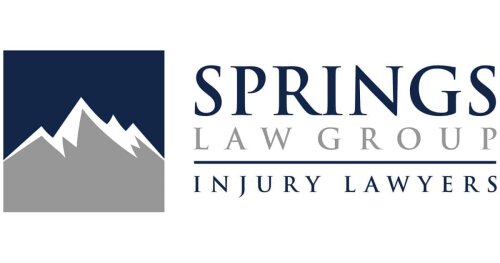Best Lawsuits & Disputes Lawyers in Colorado
Share your needs with us, get contacted by law firms.
Free. Takes 2 min.
Or refine your search by selecting a city:
List of the best lawyers in Colorado, United States

About Lawsuits & Disputes Law in Colorado, United States
In Colorado, lawsuits and disputes encompass a wide range of legal conflicts between individuals, businesses, or other entities. These cases can arise from contract disagreements, personal injuries, property disputes, employment matters, and more. Colorado courts handle both civil and criminal cases, though lawsuits and disputes typically refer to civil law matters. The state's legal system provides a structured process for resolving conflicts, including negotiating settlements, mediation, arbitration, and formal litigation in court. Understanding the basics of how these disputes are handled can help you make informed decisions and better protect your rights.
Why You May Need a Lawyer
Many people find themselves involved in legal disputes at some point in their lives. Here are common situations where you may require legal help for lawsuits and disputes in Colorado:
- Being sued by another individual, business, or entity
- Seeking damages for injuries from an accident, such as car crashes or slips and falls
- Contract disputes involving vendors, contractors, or service providers
- Real estate or property disagreements with neighbors, landlords, or tenants
- Employment matters such as wrongful termination or discrimination claims
- Business-to-business conflicts including breach of contract or partnership disputes
- Collections for unpaid debts
- Disputes regarding wills, trusts, or estate matters
An experienced lawyer can help you understand your rights, evaluate your options, draft appropriate legal documents, represent you in negotiations, and if necessary, take your case to court.
Local Laws Overview
Colorado has specific laws and procedures that govern civil lawsuits and disputes. Key aspects include:
- Statute of Limitations: Colorado law sets deadlines for filing various types of civil cases. For example, personal injury claims typically must be filed within two years, while contract disputes usually have a three-year limit.
- Court Structure: Civil cases are generally filed in county or district courts depending on the nature and dollar amount involved. Smaller claims (less than 7,500 dollars) are typically handled in small claims court, which has simplified procedures.
- Pleadings and Service: The legal process begins with filing a complaint and properly serving the opposing party, following specific rules outlined by the Colorado Rules of Civil Procedure.
- Alternative Dispute Resolution (ADR): Colorado courts often encourage or require mediation or arbitration to resolve disputes outside of court, saving time and expense for everyone involved.
- Comparative Negligence: Colorado follows a modified comparative negligence rule for personal injury claims, meaning damages may be reduced if the plaintiff is partially at fault.
- Attorney Fees: Generally, each party pays their own attorney fees unless a statute or contract says otherwise, though courts may award fees in certain cases.
Frequently Asked Questions
What are the steps involved in filing a lawsuit in Colorado?
Generally, you begin by filing a complaint with the appropriate court, serve the defendant with legal papers, and follow pretrial procedures including discovery and possible settlement conferences before trial.
What is small claims court and when should I use it?
Small claims court is designed for cases involving claims up to 7,500 dollars. It is a quicker, less formal venue for resolving minor disputes without needing a lawyer, though legal advice is still recommended.
How long do I have to file a lawsuit in Colorado?
The time depends on the type of claim. Personal injury is generally two years from the date of injury, property damage is two years, and breach of written contract is three years. Always verify the statute of limitations for your specific case.
Can I represent myself in a Colorado civil lawsuit?
Yes, you may represent yourself, known as proceeding pro se, but it is usually to your advantage to have a lawyer due to complex legal rules and procedures.
What happens after a lawsuit is filed?
The defendant is served with a copy of the complaint and summons. They must respond within a specified time. The parties then engage in discovery, attend possible settlement conferences, and if the case is not resolved, it goes to trial.
What is mediation and do I have to attend?
Mediation is a process where a neutral third party helps the disputing parties negotiate a mutually acceptable agreement. Many Colorado courts require parties to attempt mediation before proceeding to trial.
How are damages determined in Colorado lawsuits?
Damages are awarded based on the actual losses suffered, such as medical bills, property damage, lost wages, and sometimes emotional distress. Colorado law may limit damages in some cases.
Can I recover attorney fees if I win my case?
Generally, each party pays its own attorney fees. Exceptions exist if a statute or contract provides for fee-shifting or if the court finds someone's actions were particularly unreasonable or frivolous.
What if I cannot afford a lawyer?
Some lawyers offer payment plans or work on a contingency fee basis, especially for personal injury cases. You may also qualify for free or low-cost legal aid services depending on your income.
Do I need to hire a lawyer immediately if I am served with a lawsuit?
You should act quickly once served, as missing deadlines can result in a default judgment against you. Consulting with a lawyer right away is highly recommended to protect your rights.
Additional Resources
If you need more information or legal help regarding lawsuits and disputes in Colorado, consider these resources:
- Colorado Judicial Branch - For general information, forms, and court procedures
- Colorado Legal Services - Nonprofit assistance for qualifying low-income Coloradans
- Your local Bar Association - Offers lawyer referral services and legal clinics
- Colorado Office of Dispute Resolution - Provides mediation and arbitration services
- Self-Help Centers at Colorado courthouses - In-person assistance for those representing themselves
Next Steps
If you are facing a lawsuit or need to resolve a legal dispute in Colorado, here are some steps to take:
- Gather all relevant documents and information related to your dispute
- Contact a qualified attorney for a consultation to discuss your case and options
- Consider available alternative dispute resolution options, like mediation
- If working with a lawyer is not feasible, visit a self-help center or legal aid organization for assistance
- Be mindful of all deadlines and court notices to avoid default or loss of rights
- Stay organized and keep communication records with opposing parties and your lawyer
Taking prompt and informed action can make a significant difference in the outcome of your case. A legal professional can guide you through each stage of the process and help protect your interests.
Lawzana helps you find the best lawyers and law firms in Colorado through a curated and pre-screened list of qualified legal professionals. Our platform offers rankings and detailed profiles of attorneys and law firms, allowing you to compare based on practice areas, including Lawsuits & Disputes, experience, and client feedback.
Each profile includes a description of the firm's areas of practice, client reviews, team members and partners, year of establishment, spoken languages, office locations, contact information, social media presence, and any published articles or resources. Most firms on our platform speak English and are experienced in both local and international legal matters.
Get a quote from top-rated law firms in Colorado, United States — quickly, securely, and without unnecessary hassle.
Disclaimer:
The information provided on this page is for general informational purposes only and does not constitute legal advice. While we strive to ensure the accuracy and relevance of the content, legal information may change over time, and interpretations of the law can vary. You should always consult with a qualified legal professional for advice specific to your situation.
We disclaim all liability for actions taken or not taken based on the content of this page. If you believe any information is incorrect or outdated, please contact us, and we will review and update it where appropriate.
Browse lawsuits & disputes law firms by service in Colorado, United States
Colorado, United States Attorneys in related practice areas.
Browse lawsuits & disputes law firms by city in Colorado
Refine your search by selecting a city.










